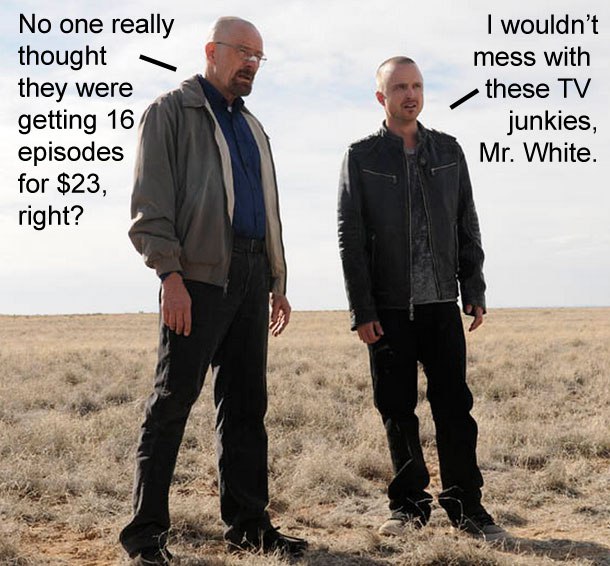Apple: Blame The TV Networks For Half-Seasons Sold At Full Price
 What is a “season” of television? It’s all the episodes filmed and aired within the same production period, isn’t it? Only networks’ habit of splitting a “season” in half has made the definition of what a “season” is kind of fuzzy. Maybe it’s an artistic decision or a cash grab, but all fans know is that they’re kind of confused.
What is a “season” of television? It’s all the episodes filmed and aired within the same production period, isn’t it? Only networks’ habit of splitting a “season” in half has made the definition of what a “season” is kind of fuzzy. Maybe it’s an artistic decision or a cash grab, but all fans know is that they’re kind of confused.
People who like to buy their TV à la carte go to iTunes, Amazon, XBOX, or some other content platform and buy each episode or a season pass to their favorite television shows that they want to watch in real-time. To save money and have their favorite shows waiting, they subscribe to a whole season ahead of time. The problem is that the “fifth season” that the download services buy isn’t the entire fifth season.
AMC’s Breaking Bad is just one example: what the network, producers, and cast call “Season 5” was written and produced in two separate blocks of eight episodes. They might as well be separate seasons, but everyone refers to the current block of episodes as the “second half” of the fifth season.
Readers wrote in with other examples of shows with split seasons: Battlestar Galactica may have been the first. The BBC’s Doctor Who aired and sold its recent season (confusingly, you call it a “series” in UK English) in halves. One reader got out the Consumerist Wayback Machine and showed us how we wrote about this very problem with South Park in 2006.
Reader Rene read our post about this problem yesterday, and wrote to Apple in annoyance. He got this answer from Apple:
Rene, I want to be of best service for you regarding this matter, however please understand that the iTunes Store is a store front that gives content providers a place to sell their items. They are given full responsibility of their content and they are the one who is in charge of their pricing, posting updates to their content, and also has control of removing their content. That being said, the second half of the Season Pass for “Breaking Bad Season 5” is intended by the content provider.
While I know that this is not the response you were hoping to receive, I hope that I was able to provide some insight as to exactly why our hands are tied in this instance. While our ability to assist remains unchanged, I can certainly understand that our policies regarding this matter may not result in positive situations for all of our customers. Based on your recent comments, I encourage you to use our official feedback page to have your voice heard. While using this page will not illicit a direct response, all entries are individually reviewed and reported to Apple management. Several adjustments to our services have been made based on comments which have come directly from our customers. I have already submitted a summary of this situation at this page, outlining why the current system may not benefit all of our customers.
Also in Apple’s outbox was a message to the reader whose complaint we posted yesterday, Martin. He asked for a refund on his purchase, because he thought that he was getting all sixteen of the “fifth season” episodes
I understand that you are concerned about not including all the episodes as in Breaking Bad season 5 and you would like a refund. Addressing your concern is really important for me and I am glad to help you in this regard.
Martin, your request for a refund for “Breaking Bad season 5” was carefully considered; however, according to the iTunes Store Terms of Sale, all purchases made on the iTunes Store are final. This policy matches Apple’s refund policies and provides protection for copyrighted materials.
You can review the iTunes Store Terms of Sale for more information.
This is as the producer intended and not the iTunes Store. I apologize for any inconvenience this may have caused.
Yeah, another $23 is still cheaper than subscribing to cable for the next few months, but we may never get a straight answer: what is a “season”?
Here is our aggressively unscientific poll:
Want more consumer news? Visit our parent organization, Consumer Reports, for the latest on scams, recalls, and other consumer issues.

